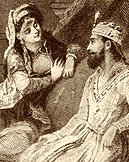From Wikipedia, the free encyclopedia
Queen Scheherazade tells her stories to King Shahryar.
Arabian Nights redirects here. For other uses, see Arabian Nights (disambiguation)
 The Book of One Thousand and One Nights (كتاب ألف ليلة و ليلة in Arabic or هزار و یک شب in Persian), also known as The book of a Thousand Nights and a Night, 1001 Arabian Nights, or simply the Arabian Nights, is a piece of medieval Middle-Eastern literature in the style of a frame tale. The nucleus of these stories is formed by an old Persian book called Haz The story starts with the Persian Shahryar, king of an unnamed island "between India and China" (in modern editions based on Arab transcripts he is king of India and China), being so shocked by his wife's infidelity that he kills her and, believing all women to be likewise unfaithful, gives his vizier an order to get him a new wife every night (in some versions, every third night). After spending one night with his bride, the king has her executed at dawn. This practice continues for some time, until the vizier's clever daughter Shahrazad (the name is perhaps better-known in English as "Scheherazade" or "Shahrastini", which is a Persian name) forms a plan and volunteers to become Shahrayar's next wife. Every night after their marriage, she spends hours telling him stories, each time stopping at dawn with a cliff-hanger, so the king will postpone the execution out of a desire to hear the rest of the tale. In the end, she has given birth to three sons, and the king has been convinced of her faithfulness and revoked his decree.
The Book of One Thousand and One Nights (كتاب ألف ليلة و ليلة in Arabic or هزار و یک شب in Persian), also known as The book of a Thousand Nights and a Night, 1001 Arabian Nights, or simply the Arabian Nights, is a piece of medieval Middle-Eastern literature in the style of a frame tale. The nucleus of these stories is formed by an old Persian book called Haz The story starts with the Persian Shahryar, king of an unnamed island "between India and China" (in modern editions based on Arab transcripts he is king of India and China), being so shocked by his wife's infidelity that he kills her and, believing all women to be likewise unfaithful, gives his vizier an order to get him a new wife every night (in some versions, every third night). After spending one night with his bride, the king has her executed at dawn. This practice continues for some time, until the vizier's clever daughter Shahrazad (the name is perhaps better-known in English as "Scheherazade" or "Shahrastini", which is a Persian name) forms a plan and volunteers to become Shahrayar's next wife. Every night after their marriage, she spends hours telling him stories, each time stopping at dawn with a cliff-hanger, so the king will postpone the execution out of a desire to hear the rest of the tale. In the end, she has given birth to three sons, and the king has been convinced of her faithfulness and revoked his decree.






























